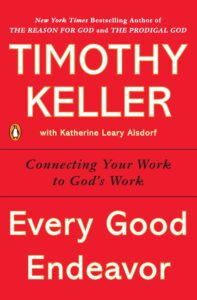Editor's note: This is the first of a three-part blog series exploring "Every Good Endeavor" by Tim Keller and Katherine Leary Alsdorf. The Denver Institute for Faith & Work Book Club will explore books, share ideas, and encourage each other as we integrate our faith and work. Share your thoughts in our private Linkedin Group.

Most basically, Alsdorf and Keller wrote this book to help Christians re-connect two spheres of life that, somewhere along the line, drifted apart but should have always remained together: our faith and our daily work. To bridge the divide between faith and work, though, we’ll have some unlearning to do.
In particular, Alsdorf and Keller argue that Christians need to be able to name the stories our culture tells about work, which are incomplete at best and destructive at worst. We also need to recognize the ways in which we have adopted these cultural narratives without much resistance, and start living according to a different story. What’s more, even though Christians may have some vague idea that their faith should impact their work, it can be hard to know what this looks like in practice. For all of their strengths, the various “faith and work” models currently on offer share one common deficiency, as Alsdorf explains:
“The models were few and often seemed remnants of an age when most of America went to church. One CEO would share that he kept a Bible on his desk and that occasionally someone in the company would ask about it. Another prayed and the company thrived. Many viewed their corporate jobs primarily as a means to make lots of money to give away to charities and organizations they cared about. . . . And none of these approaches addressed the issue of how Christians’ faith should affect the way they worked.”
Instead of approaching our work as a means to an end—to provide for our families, to make money so we can give it away to “real” ministry workers (such as pastors or missionaries), to find opportunities to evangelize, or whatever it is—Alsdorf and Keller urge us to think of our work as an end in itself. So, on the one hand, we need to rediscover the dignified place of work in the mission of God, where our work becomes a way to cultivate the communities where we live or serve our neighbors, to name only two examples. On the other hand, we need a more expansive understanding of the gospel than we sometimes hear. Yes, Jesus did die to save us from our sins so that we can be with him forever, but he is also “making all things new” (Revelation 21:5). “All things” includes our work.
As you explore the biblical theology of work presented by Alsdorf and Keller in this first section of the book, take some time to reflect on the following questions.
Reflection
1. Think about your experiences in the church. How were you taught to think about the relationship between your faith and your work? When have you seen faith and work done well? When have you seen it done poorly?
2. Alsdorf and Keller show that the rhythm of work and rest is modeled by God himself, and that work is an inherent component of God’s good creation (and not a curse or a consequence of the fall). Why do you think that God gave Adam and Eve work to do when he could have done it all himself (and done it better)? What does this say about God’s character? What does it say about what it means to be human?
3. Alsdorf and Keller suggest that modern Americans have inherited a distaste for work from the world of ancient Greek and Roman philosophy: we work because we have to, but leisure is the ideal. How does the story the Bible tells about work differ from this cultural conception? Why, according to the writers of Scripture, should we recognize dignity in all work?
4. According to Alsdorf and Keller, Genesis 1–2 present a vision of work as both cultivation and service. As the Bible tells it, human beings have a vocation: that is, they are called to care for the created world and to serve our neighbors through our work. How have you heard the word “vocation” used in discussions around work? How, according to Alsdorf and Keller, do the Bible and the Christian tradition define calling? How would a more expansive and biblical understanding of vocation change your approach to your daily work?
Keep the conversation going! Join us in our private Linkedin Group to share your thoughts.

